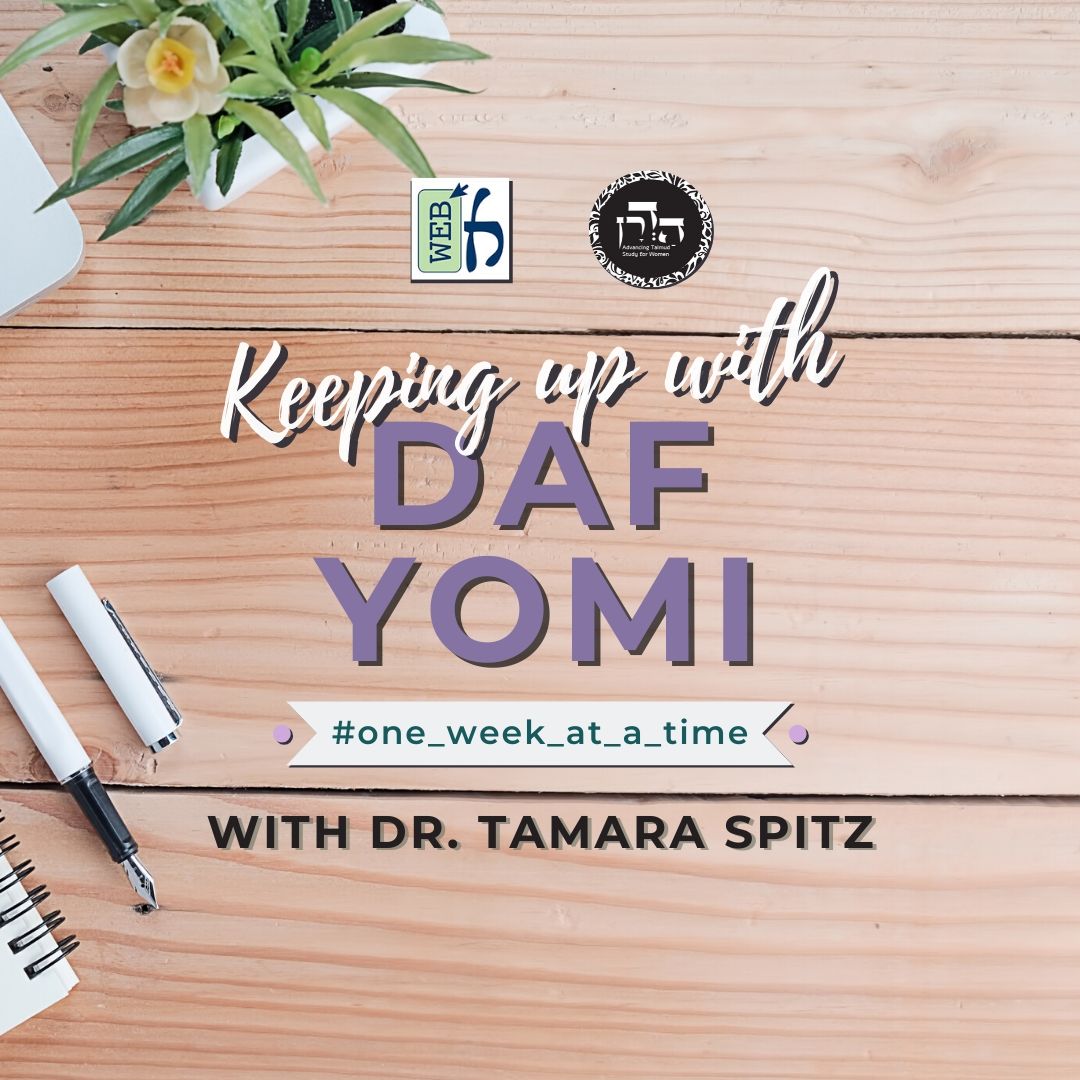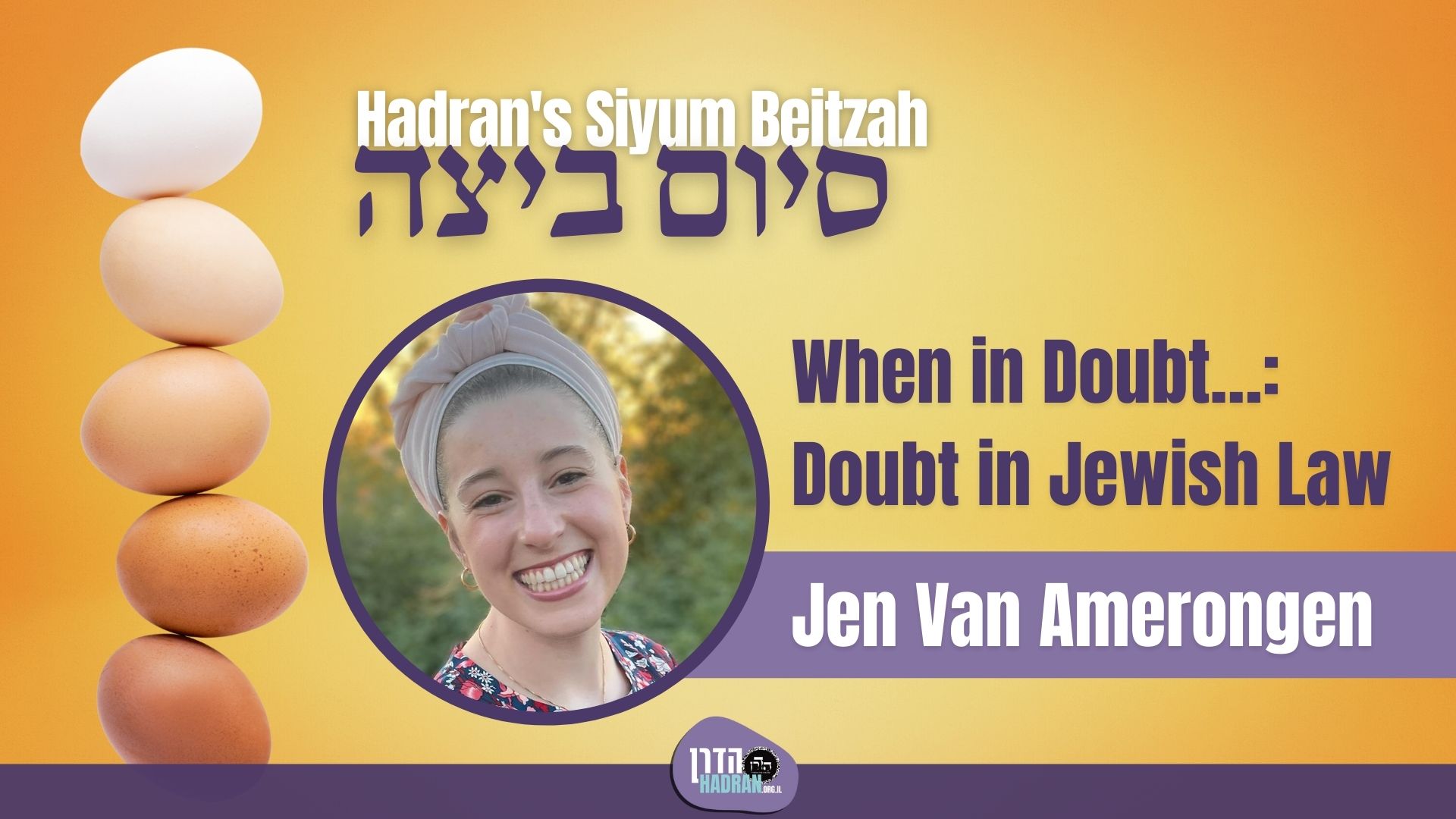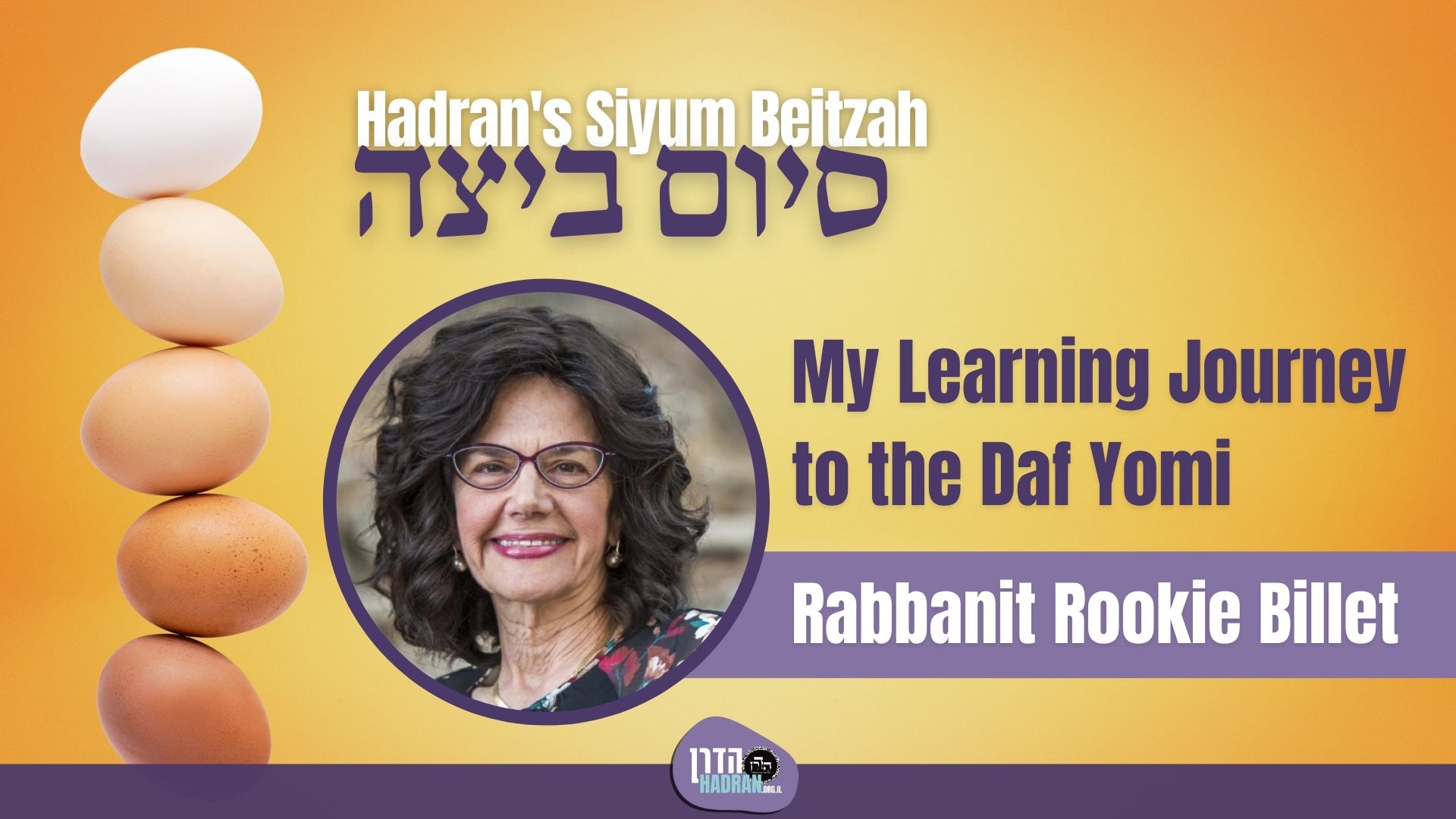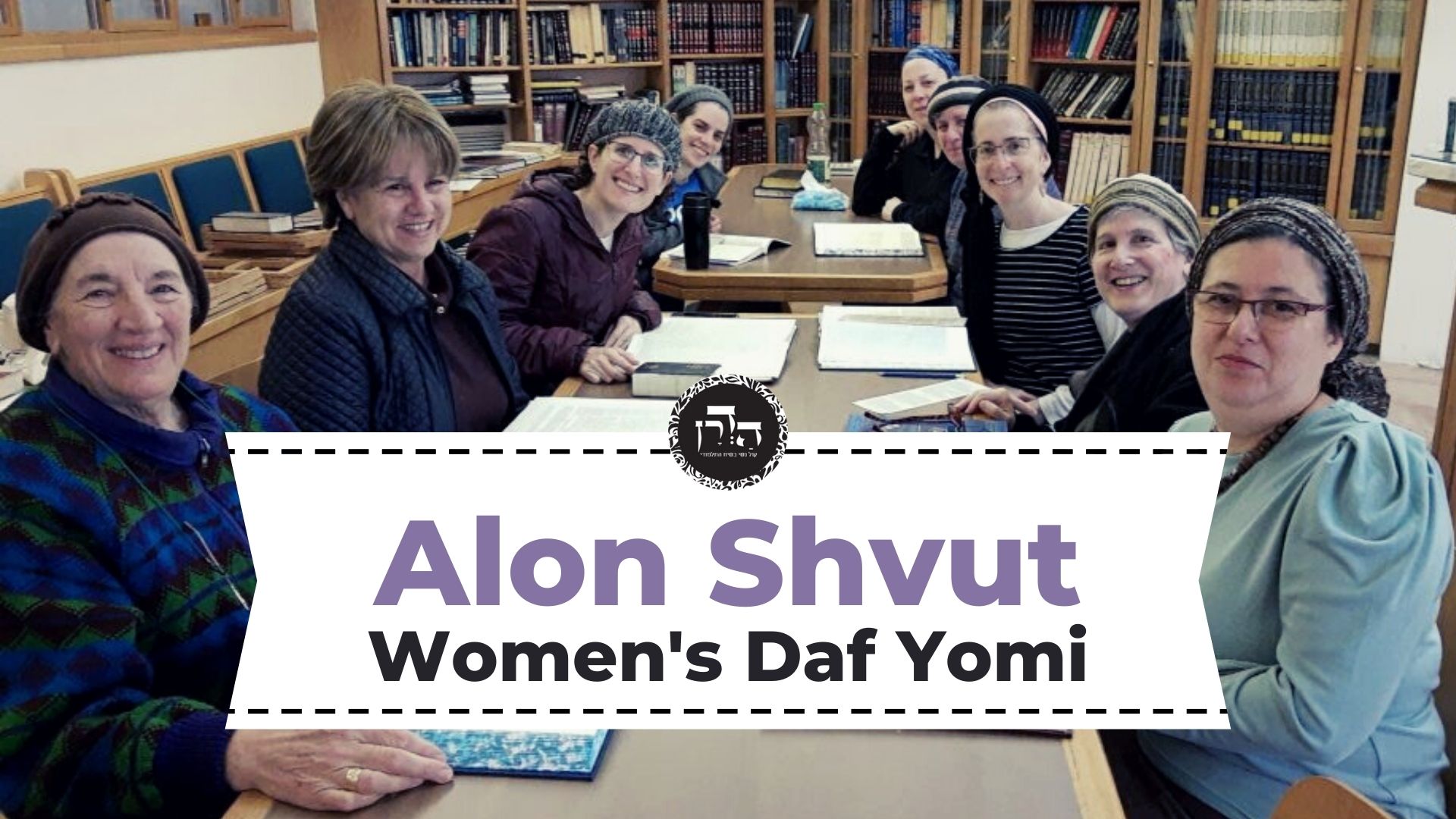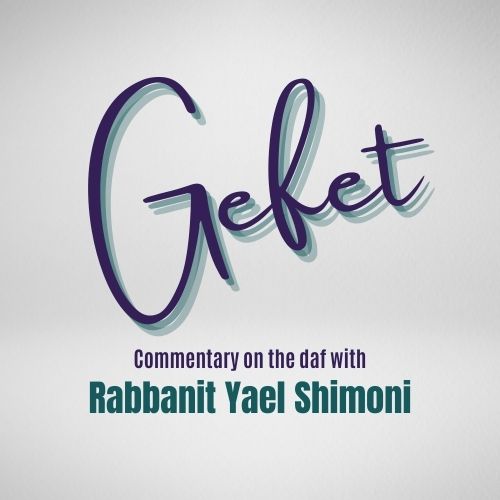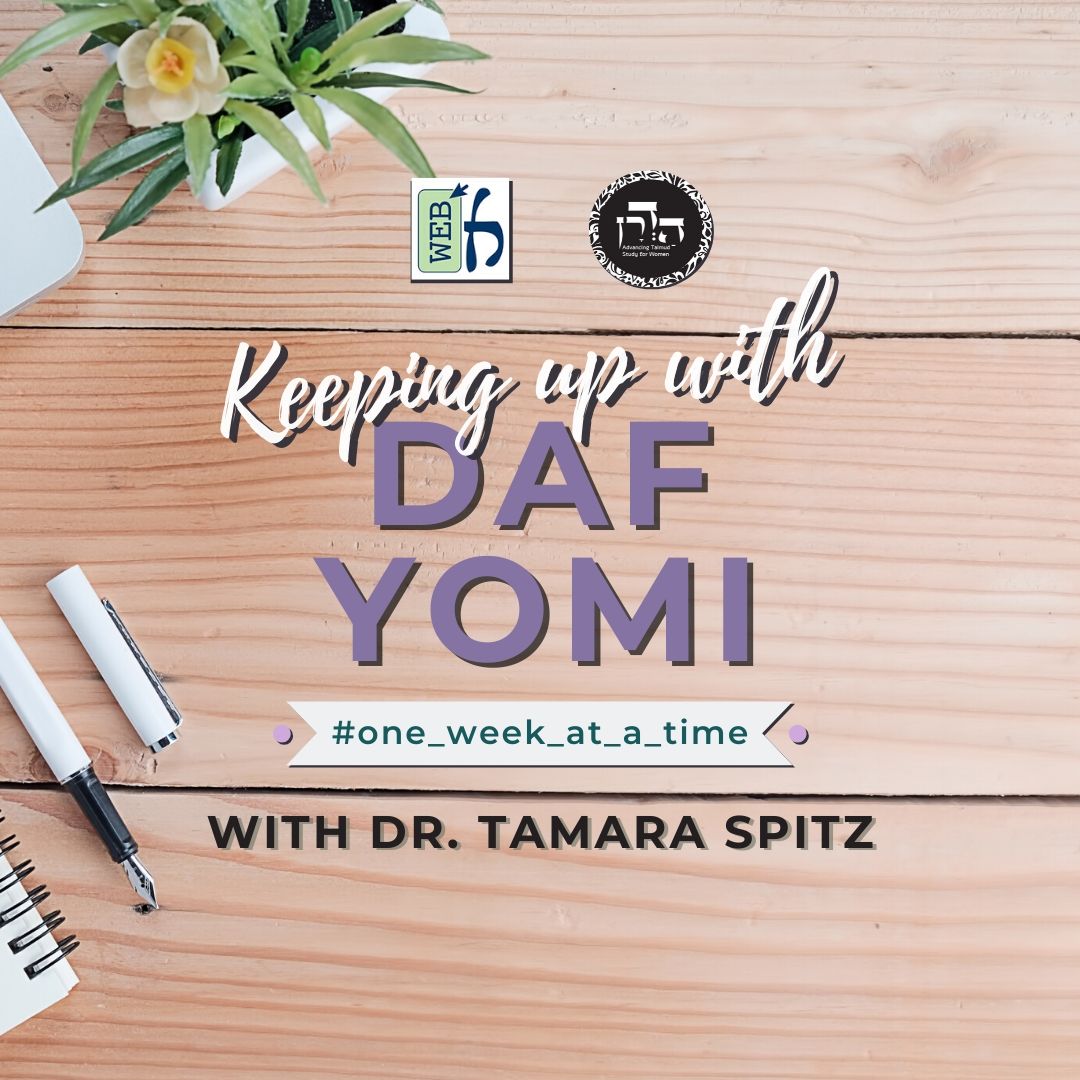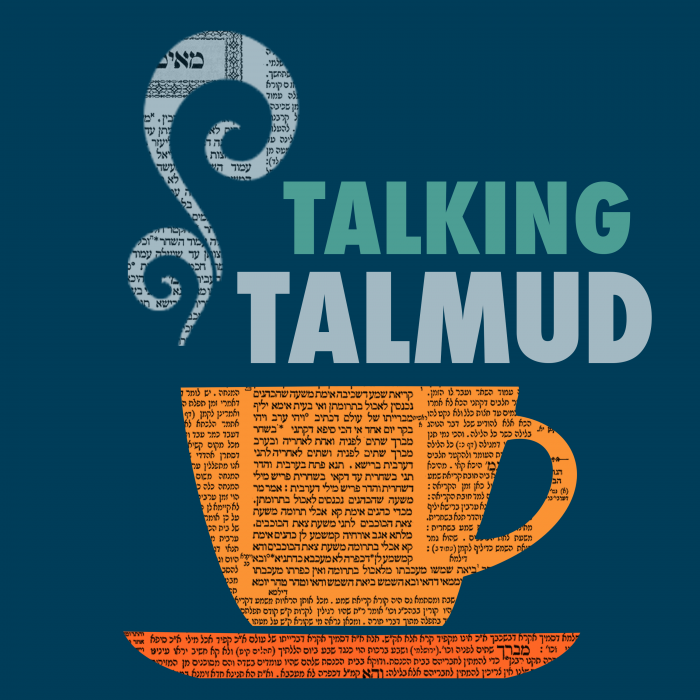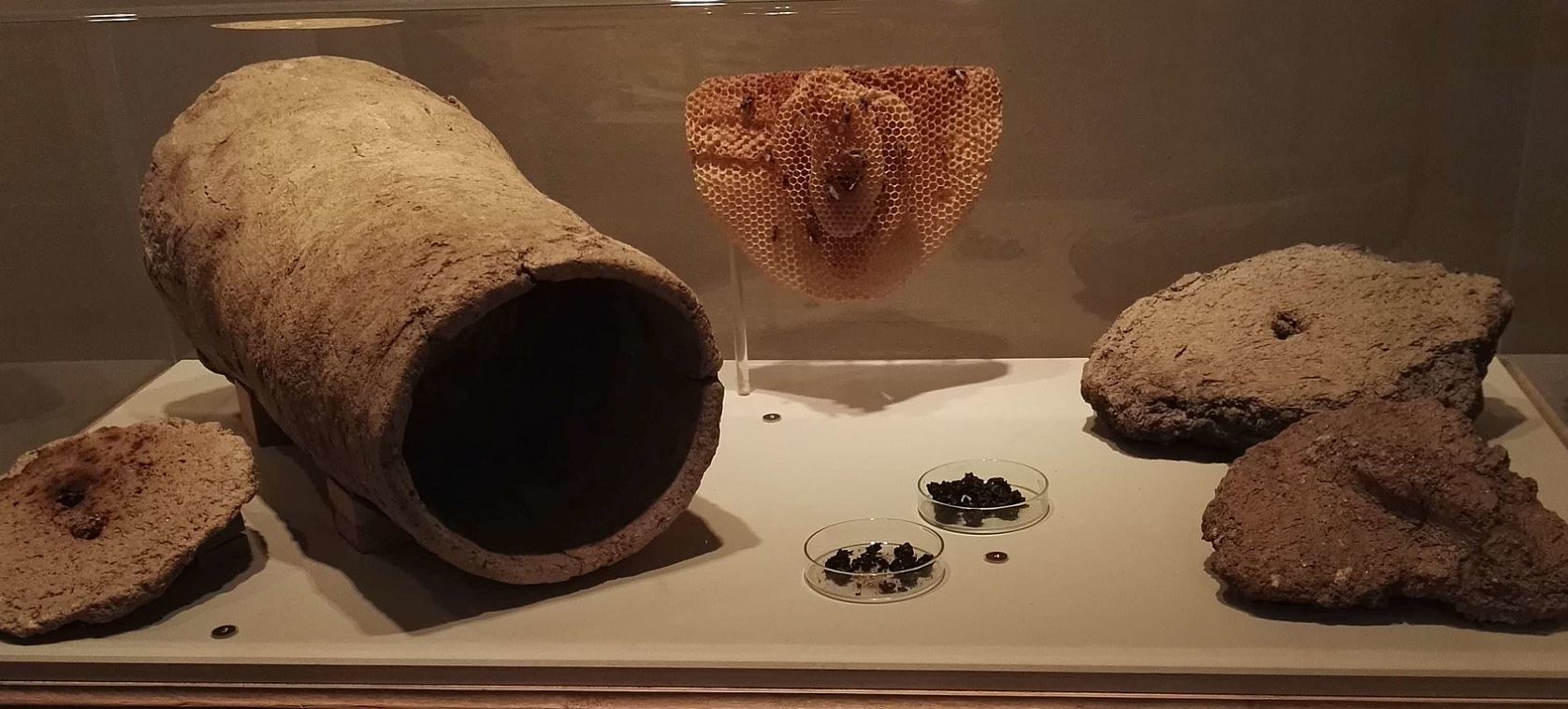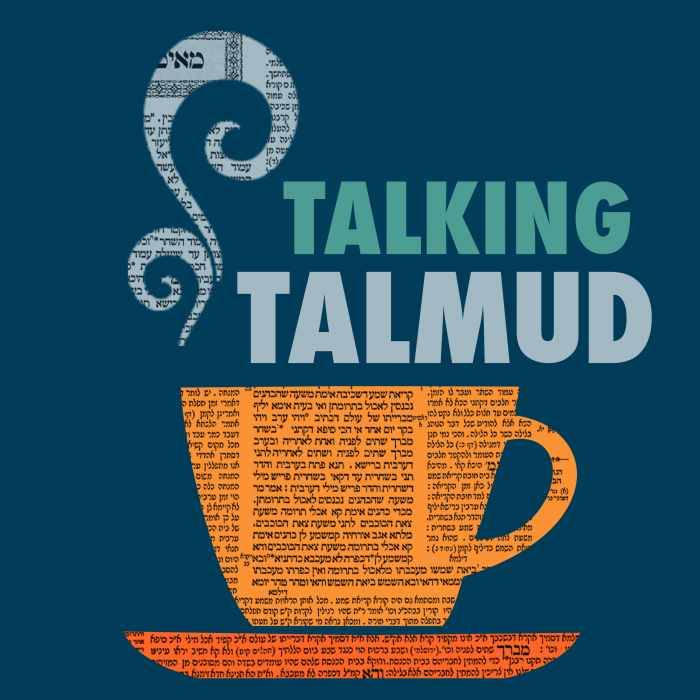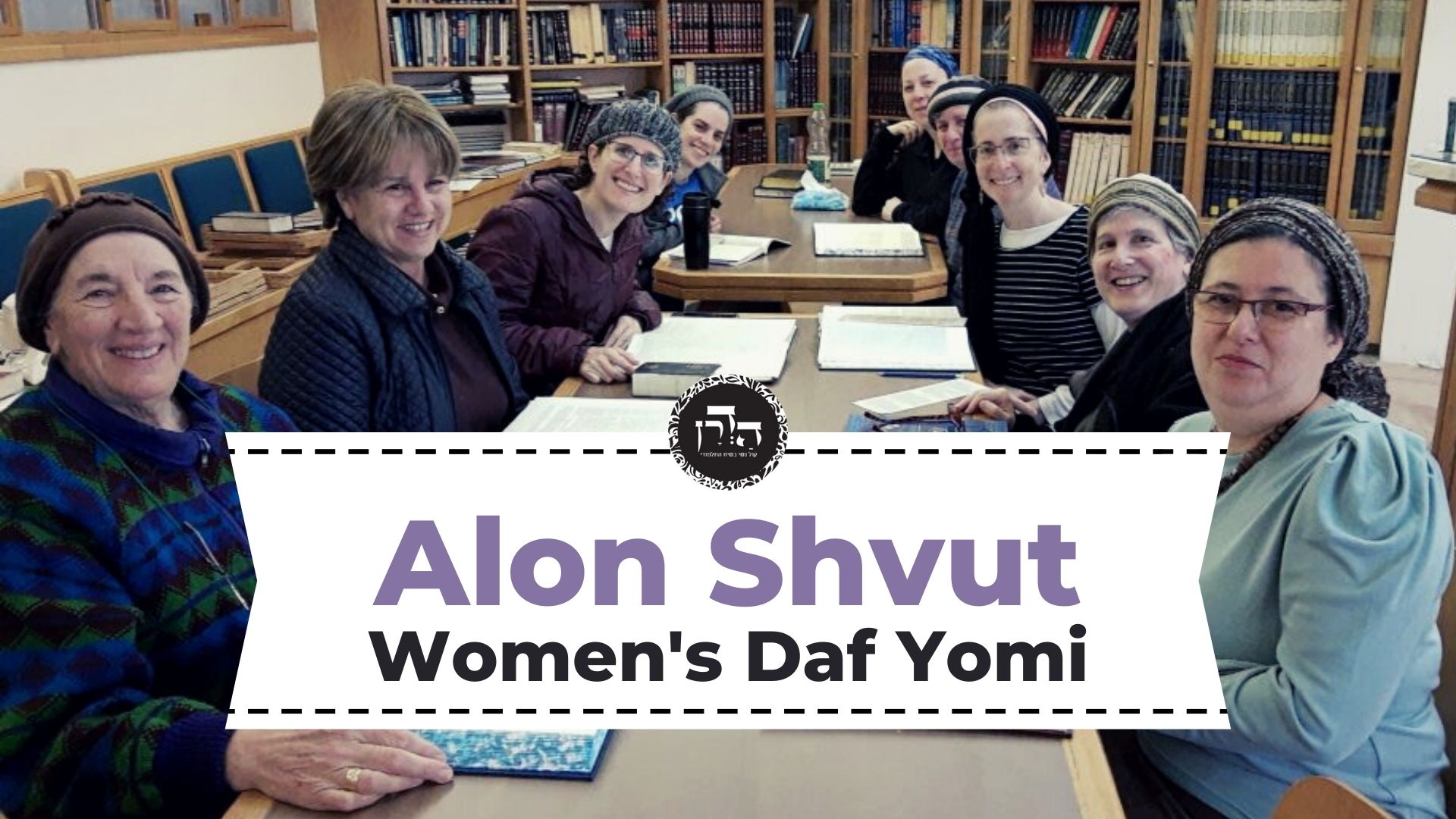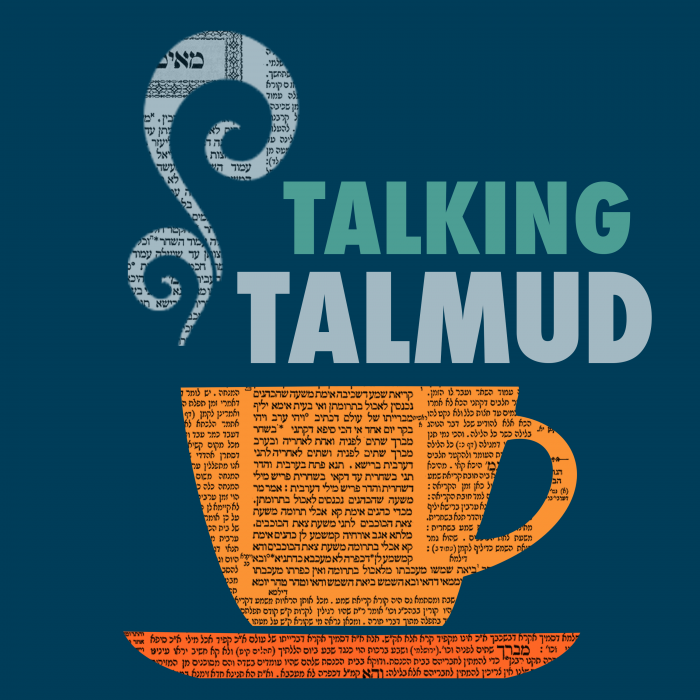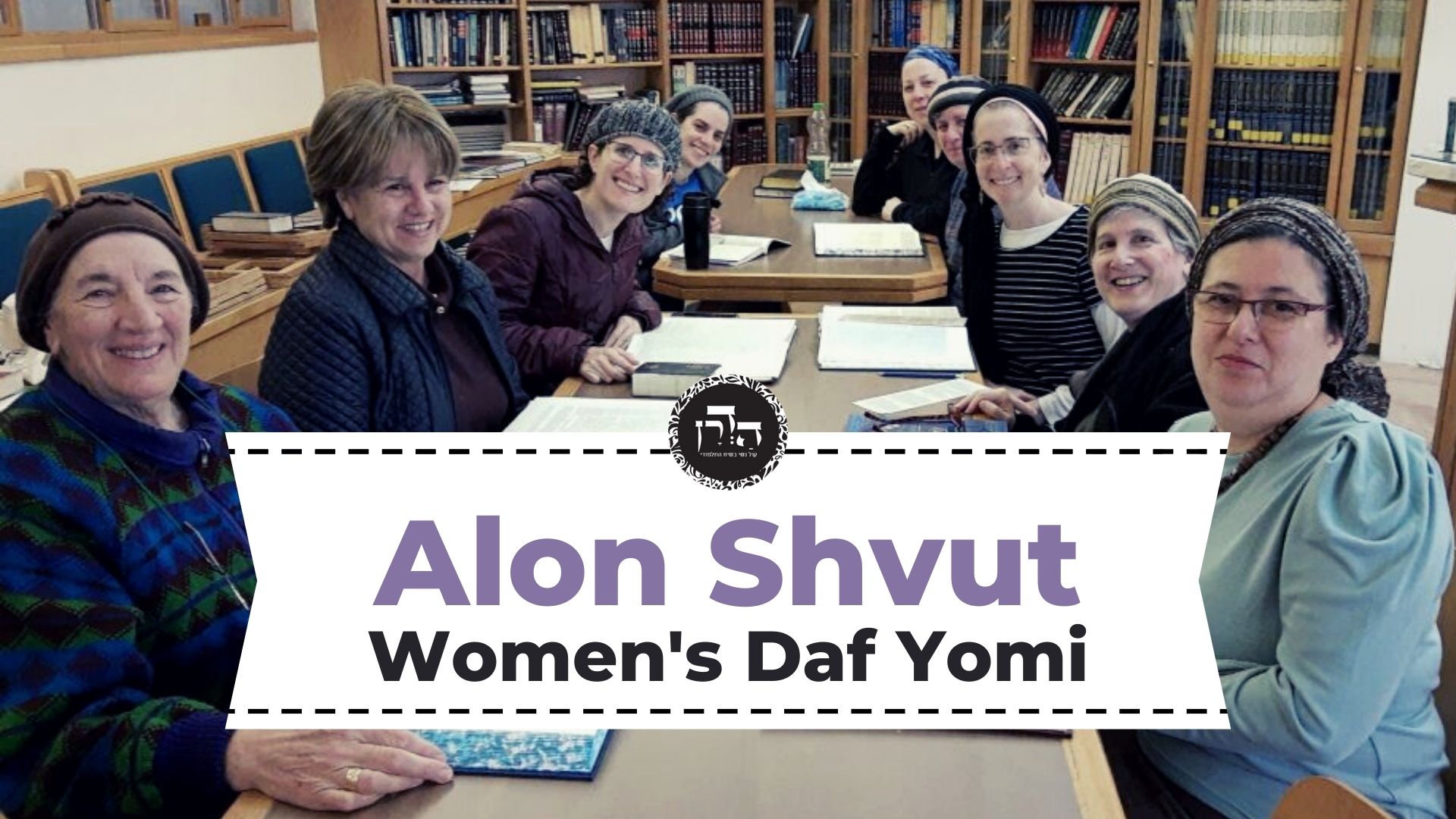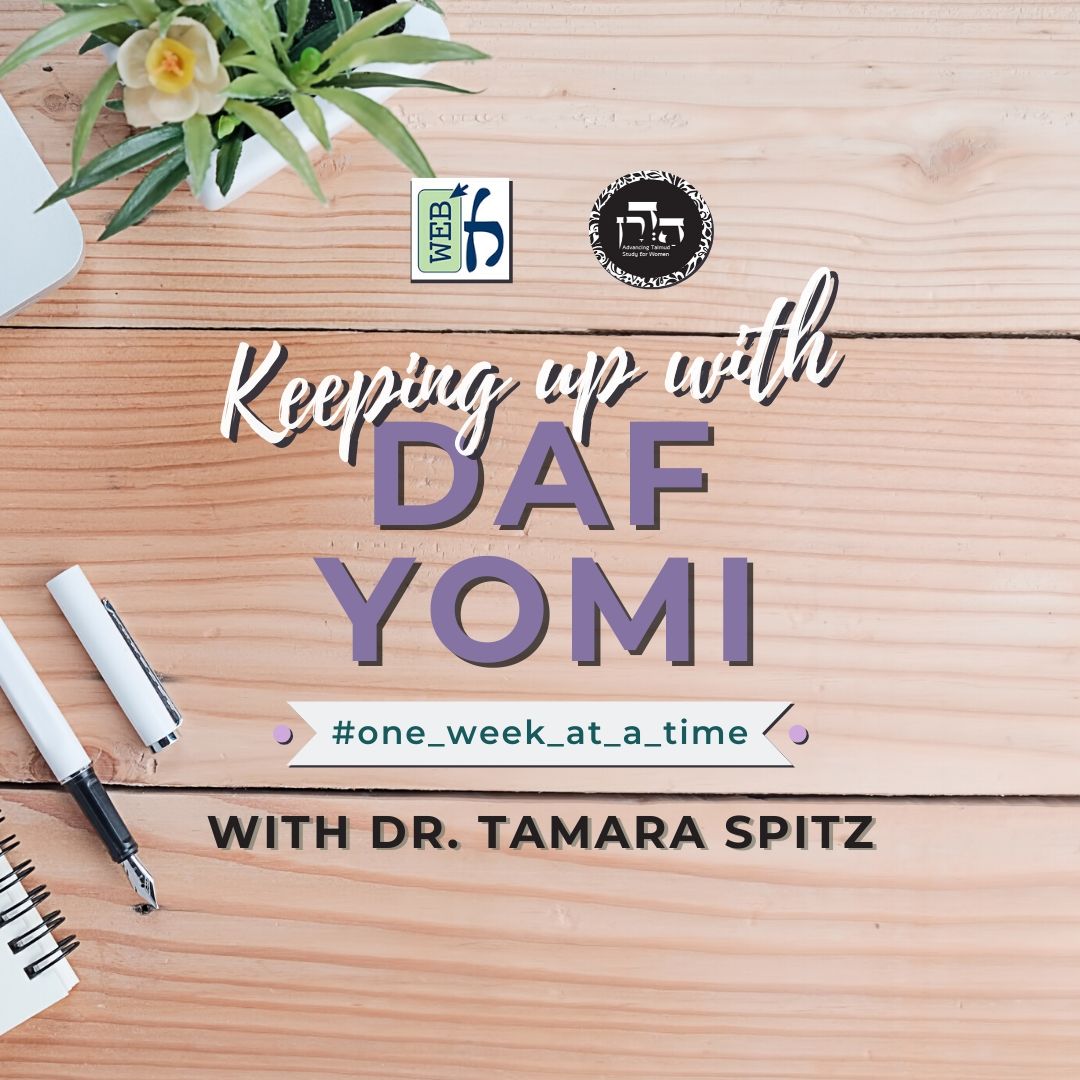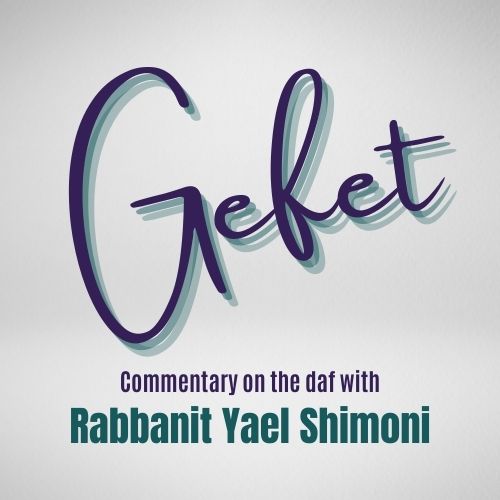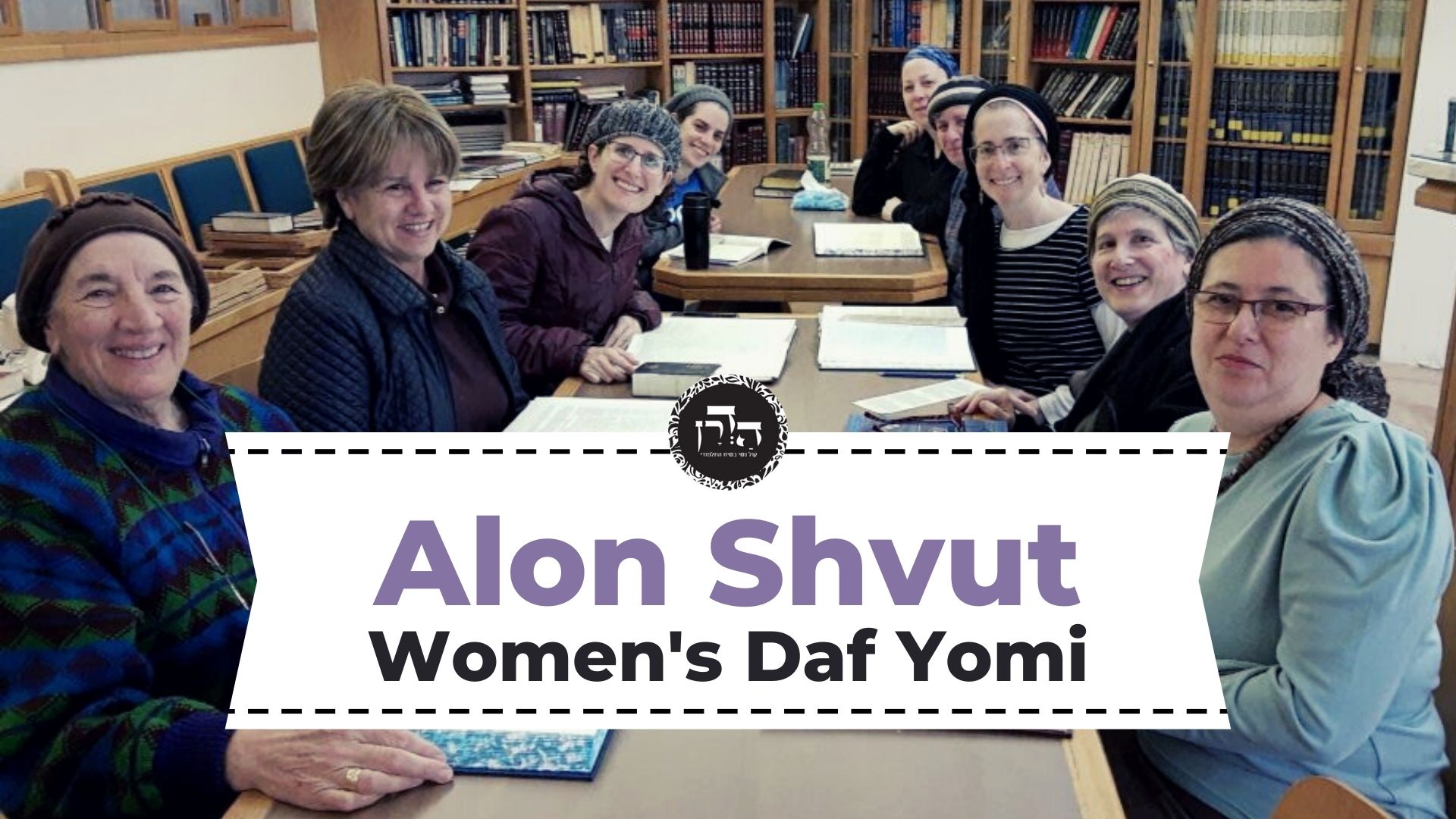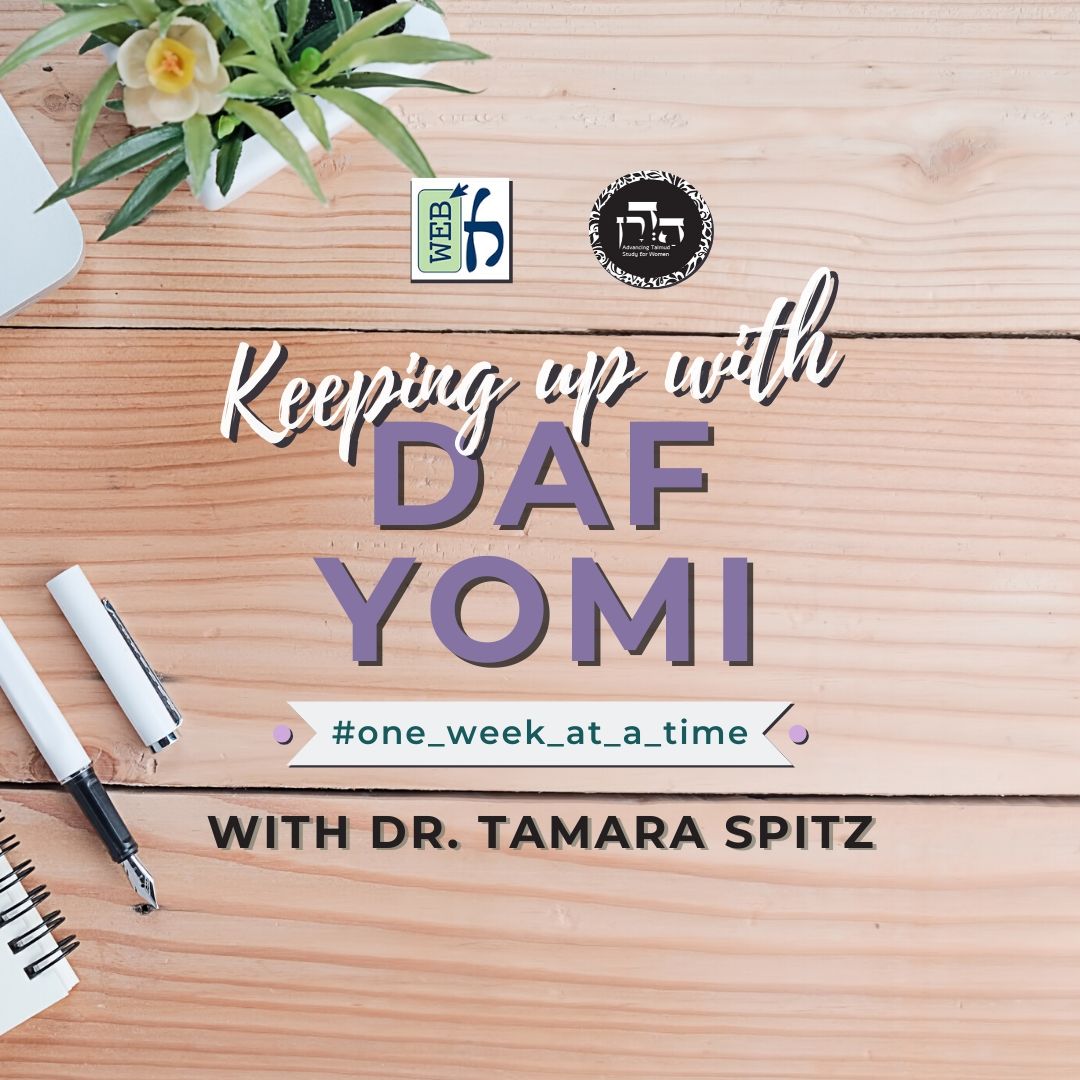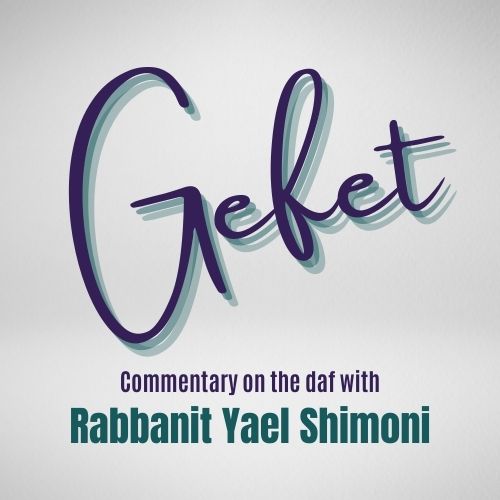Shmuel rules on undoing ropes that are fastened to the ground or to an object. He differentiates between the two regarding how one can do it, however, he does not distinguish between Shabbat and Yom Tov. The Gemara raises a difficulty against him from the braita where a distinction between Shabbat and Yom Tov is made regarding this issue. They answer that Samuel must hold like the tana of a different braita. But even on this, there is a difficulty because some of his words correspond to the words of the tana and some do not. To solve this problem, it is assumed that one part of the braita has to do with an unrelated reason as he holds like Rabbi Nehemiah who has a very strict definition of muktze and only allows the use of a vessel for its usual use and not for any other use. There is also a difficulty on that which the Gemara resolves. Creating a tool on a Yom Tov is forbidden. The Mishnah gives some examples and the Gemara discusses the controversy over what stage is it considered that the utensil is built/finished both for laws of impurity and for Shabbat/Yom Tov. According to Rabbi Yehuda, it is possible to cut a wick in two by using fire. How does this solve the problem that he is creating an object? Six laws were said regarding wicks – three stringencies and three leniencies. What are they? Rabbi Natan Bar Abba brings on behalf of Rav a harsh criticism of the wealthy Jews of Babylonia who showed no mercy. The Gemara brings a number of statements on how difficult it is for a person who has to rely on others for one’s livelihood. It is said about the following people that they “have no life” – one who relies on others for one’s livelihood, one whose wife rules over him, and one whose body is enduring suffering and some say also one who only has one garment to wear. The Mishnah continues with a list of other things that should not be done on Yom Tov because it is considered creating a vessel as well as some other prohibitions. One cannot rake the ashes from an oven unless it affects the quality of the food. It is forbidden to build a stove out of two barrels. Why is it forbidden to do this but it is permitted to take stones in the outhouse and form from it a chair to use as a toilet – is it not a similar type of “building”?
This week’s learning is sponsored by Nira Feldman in loving memory of her mother, Faye Darack Z’L 3rd yahrzeit. “She was a dedicated Hadran learner and continues to inspire us with her curiosity and love of learning each day. We miss her deeply.”
This week’s learning is sponsored by Nira Feldman in loving memory of her mother, Faye Darack Z’L 3rd yahrzeit. “She was a dedicated Hadran learner and continues to inspire us with her curiosity and love of learning each day. We miss her deeply.”
Want to dedicate learning? Get started here:


Today’s daily daf tools:
This week’s learning is sponsored by Nira Feldman in loving memory of her mother, Faye Darack Z’L 3rd yahrzeit. “She was a dedicated Hadran learner and continues to inspire us with her curiosity and love of learning each day. We miss her deeply.”
This week’s learning is sponsored by Nira Feldman in loving memory of her mother, Faye Darack Z’L 3rd yahrzeit. “She was a dedicated Hadran learner and continues to inspire us with her curiosity and love of learning each day. We miss her deeply.”
Today’s daily daf tools:
Delve Deeper
Broaden your understanding of the topics on this daf with classes and podcasts from top women Talmud scholars.
New to Talmud?
Check out our resources designed to help you navigate a page of Talmud – and study at the pace, level and style that fits you.
The Hadran Women’s Tapestry
Meet the diverse women learning Gemara at Hadran and hear their stories.
Beitzah 32
הוּא דְּאָמַר כִּי הַאי תַּנָּא, דְּתַנְיָא: חוֹתָמוֹת שֶׁבַּקַּרְקַע — מַתִּיר, אֲבָל לֹא מַפְקִיעַ וְלֹא חוֹתֵךְ, אֶחָד שַׁבָּת וְאֶחָד יוֹם טוֹב. וְשֶׁבַּכְּלִי — בְּשַׁבָּת מַתִּיר, אֲבָל לֹא מַפְקִיעַ וְלֹא חוֹתֵךְ, בְּיוֹם טוֹב — מַתִּיר וּמַפְקִיעַ וְחוֹתֵךְ.
The Gemara responds: It was he, Shmuel, who spoke in accordance with the opinion of that tanna, as it is taught in a baraita: With regard to fastenings that are to the ground, e.g., those on doors, one may untie them but not unravel or cut them, both on Shabbat and on a Festival. And with regard to those fastenings of a vessel, on Shabbat one may untie them, but one may not unravel or cut them; on a Festival one may untie, or unravel, or cut them.
תָּרֵצְתְּ לָךְ רֵישָׁא, אֶלָּא סֵיפָא קַשְׁיָא!
The Gemara challenges further: You have thereby answered the first clause of Shmuel’s statement, with regard to fastenings attached to the ground, e.g., those on doors, by finding a tanna who permits untying them, as does Shmuel. However, the latter clause is difficult because the baraita states that one may not unravel even ropes of vessels on Shabbat, whereas Shmuel permits unraveling in all cases.
הָא מַנִּי — רַבִּי נְחֶמְיָה הִיא, דְּאָמַר: כׇּל הַכֵּלִים אֵין נִיטָּלִין אֶלָּא דֶּרֶךְ תַּשְׁמִישָׁן.
The Gemara answers: In accordance with whose opinion is this baraita? It is in accordance with the opinion of Rabbi Neḥemya, whose opinion is a minority view, as he said: All vessels may be handled only in the manner of their designated use. Therefore, the rope may not be cut, not because it is prohibited to unravel it but because one may not handle a knife for this purpose, as the designated use of the knife is cutting food rather than rope.
אִי רַבִּי נְחֶמְיָה, מַאי אִירְיָא שַׁבָּת? אֲפִילּוּ יוֹם טוֹב נָמֵי! וְכִי תֵּימָא שַׁנְיָא לֵיהּ לְרַבִּי נְחֶמְיָה בֵּין שְׁבוּת שַׁבָּת לִשְׁבוּת יוֹם טוֹב, וּמִי שַׁנְיָא לֵיהּ?
The Gemara challenges: If it is in accordance with the opinion of Rabbi Neḥemya, why discuss particularly Shabbat? The same halakha should apply even on a Festival, as there is no distinction between Shabbat and Festivals with regard to the halakhot of handling items. And if you say that there is a distinction according to Rabbi Neḥemya between a rabbinic decree of Shabbat, when a vessel may be moved only for its designated purpose, and a rabbinic decree of a Festival, when it may not be moved for any purpose, there is a problem. Does he differentiate between them in this manner?
וְהָתָנֵי חֲדָא: מַסִּיקִין בְּכֵלִים וְאֵין מַסִּיקִין בְּשִׁבְרֵי כֵלִים, וְתַנְיָא אִידַּךְ: מַסִּיקִין בֵּין בְּכֵלִים בֵּין בְּשִׁבְרֵי כֵּלִים, וְתַנְיָא אִידַּךְ: אֵין מַסִּיקִין לֹא בְּכֵלִים וְלֹא בְּשִׁבְרֵי כֵלִים.
But isn’t it taught in one baraita: On a Festival one may kindle fire with vessels, but one may not kindle fire with shards of vessels, as they are muktze? And it is taught in another baraita: One may kindle fire both with vessels and with shards of vessels. And it is taught in yet another baraita: One may kindle fire neither with vessels nor with shards of vessels.
וּמְשַׁנֵּי, לָא קַשְׁיָא: הָא רַבִּי יְהוּדָה, הָא רַבִּי שִׁמְעוֹן, הָא רַבִּי נְחֶמְיָה!
And this contradiction between the baraitot is resolved in the following manner: It is not difficult; this first baraita is in accordance with the opinion of Rabbi Yehuda, who accepts the law of muktze. One may therefore kindle fire with vessels, as they are not muktze, but not with shards of vessels, as they are muktze and may not be handled. This second baraita is in accordance with the opinion of Rabbi Shimon, who does not accept the law of muktze. According to him, one may use shards of vessels as well. This one that prohibits using even vessels that are intact is in accordance with the opinion of Rabbi Neḥemya, who allows vessels to be used only for their designated purpose. This indicates that Rabbi Neḥemya prohibits handling even whole vessels on Festivals as well.
תְּרֵי תַנָּאֵי וְאַלִּיבָּא דְּרַבִּי נְחֶמְיָה.
The Gemara replies: These are two tanna’im who both hold in accordance with the opinion of Rabbi Neḥemya. Two later tanna’im disagreed with each other in reporting the opinion of Rabbi Neḥemya. Both agree that one may use vessels only for their designated purpose, but they disagree with regard to whether this halakha applies only on Shabbat or on Festivals as well.
מַתְנִי׳ אֵין פּוֹחֲתִין אֶת הַנֵּר מִפְּנֵי שֶׁהוּא עוֹשֶׂה כֶּלִי, וְאֵין עוֹשִׂין פֶּחָמִין בְּיוֹם טוֹב, וְאֵין חוֹתְכִין אֶת הַפְּתִילָה. רַבִּי יְהוּדָה אוֹמֵר: חוֹתְכָהּ בָּאוּר.
MISHNA: On a Festival, one may not hollow out a piece of clay to form a lamp into which he will place oil and a wick because he thereby creates a vessel. And similarly, one may not produce charcoal at all on a Festival because this is not labor for sustenance. And similarly, one may not cut the wick, as this is considered mending a vessel. Rabbi Yehuda says: If one requires a wick of a particular length, he may cut it by burning it in a fire but not by cutting it with a knife.
גְּמָ׳ מַאן תְּנָא דִּפְחִיתַת נֵר מָנָא הוּא? אָמַר רַב יוֹסֵף: רַבִּי מֵאִיר הִיא. דְּתַנְיָא: כְּלִי חֶרֶס, מֵאֵימָתַי מְקַבֵּל טוּמְאָה — מִשֶּׁנִּגְמְרָה מְלַאכְתּוֹ, דִּבְרֵי רַבִּי מֵאִיר. רַבִּי יְהוֹשֻׁעַ אוֹמֵר: מִשֶּׁיִּצְרְפוֹ בַּכִּבְשָׁן.
GEMARA: Who is the tanna who taught that hollowing out a lamp is considered creating a vessel, even if it is not fired in a furnace? Rav Yosef said: It is Rabbi Meir, as it is taught in a baraita with regard to the halakhot of ritual impurity: From when is an earthenware vessel susceptible to ritual impurity? It is from when its work is completed, i.e., when the clay has been made into the form of a vessel; this is the statement of Rabbi Meir. Rabbi Yehoshua says: It is from when the vessel is fired in the furnace.
אֲמַר לֵיהּ אַבָּיֵי: מִמַּאי? דִּלְמָא עַד כָּאן לָא קָאָמַר רַבִּי מֵאִיר הָתָם אֶלָּא דַּחֲזֵי לְקַבּוֹלֵי בֵּיהּ מִידֵּי, אֲבָל הָכָא לְמַאי חֲזִי? לְקַבּוֹלֵי בֵּיהּ פְּשִׁיטֵי.
Abaye said to him: From where do you conclude that this is the same opinion? Perhaps Rabbi Meir stated his opinion only there, with regard to vessels, since they are fit to contain something. Although they cannot hold liquids before being fired in a furnace, they can contain other items. But here, for what use is this lamp fit? The Gemara responds: It can be used to contain small coins.
אִיכָּא דְּאָמְרִי, אָמַר רַב יוֹסֵף: רַבִּי אֱלִיעֶזֶר בְּרַבִּי צָדוֹק הִיא, דִּתְנַן: אִלְפָּסִין חִרָנִיּוֹת — טְהוֹרוֹת בְּאֹהֶל הַמֵּת, וּטְמֵאוֹת בְּמַשָּׂא הַזָּב.
Some say the following version of the discussion: Rav Yosef said: The mishna is in accordance with the opinion of Rabbi Eliezer, son of Rabbi Tzadok, as we learned: Ḥaraniyyot pots [ilpasin] are unfinished earthenware pots made together with their covers. The covers are removed after they are fired in a furnace. They are pure with regard to contracting the impurity of a tent over a corpse, as they do not have a receptacle. Earthenware vessels can contract impurity imparted by a corpse only if they have a hollow space that can contain something. But ḥaraniyyot pots are rendered impure by the carrying of a zav, even if the zav moved them without actually touching them, as this impurity applies to any earthenware vessels that serve some purpose.
רַבִּי אֱלִיעֶזֶר בְּרַבִּי צָדוֹק אוֹמֵר: אַף טְהוֹרוֹת בְּמַשָּׂא הַזָּב, לְפִי שֶׁלֹּא נִגְמְרָה מְלַאכְתָּן.
Rabbi Eliezer, son of Rabbi Tzadok, says: These vessels are even pure with regard to the impurity imparted by the carrying of a zav because their labor is not completed; therefore, they are not fully formed. This implies that when the pots are completed, they are considered full-fledged vessels, even before they have been fired in a furnace.
אֲמַר לֵיהּ אַבָּיֵי: דִּלְמָא עַד כָּאן לָא קָאָמַר רַבִּי אֱלִיעֶזֶר בְּרַבִּי צָדוֹק הָתָם, אֶלָּא דַּחֲזֵי לְקַבּוֹלֵי בֵּיהּ מִידֵּי, אֲבָל הָכָא לְמַאי חָזֵי? לְקַבּוֹלֵי בֵּיהּ פְּשִׁיטֵי.
Abaye said to him: Perhaps it is not so, as it is possible to say that Rabbi Eliezer, son of Rabbi Tzadok, stated his opinion only there, in the case of ḥaraniyyot pots, since they are fit to contain something. But here, in the case of a lamp, for what is it fit? The Gemara replies: It is fit to contain small coins.
תָּנוּ רַבָּנַן: אֵין פּוֹחֲתִין אֶת הַנֵּר, וְאֵין עוֹשִׂין אִלְפָּסִין חִרָנִיּוֹת בְּיוֹם טוֹב. רַבָּן שִׁמְעוֹן בֶּן גַּמְלִיאֵל מַתִּיר בְּאִלְפָּסִין חִרָנִיּוֹת. מַאי חִרָנִיּוֹת? אָמַר רַב יְהוּדָה: עִרָנִיּוֹת. מַאי עִרָנִיּוֹת? אָמַר אַבָּיֵי: צָעֵי חַקְלָיָיתָא.
The Sages taught: One may not hollow out a lamp, and one may not create ḥaraniyyot pots on a Festival. Rabban Shimon ben Gamliel permits creating ḥaraniyyot pots. The Gemara asks: What is the meaning of ḥaraniyyot? Rav Yehuda said: They are pots of a city [iraniyyot]. The Gemara again inquires: What is the meaning of iraniyyot? Abaye said: It means villagers’ bowls who will use even clay vessels that have not been fully formed or fired, as they are not particular with regard to half-finished utensils.
וְאֵין עוֹשִׂין פֶּחָמִין. פְּשִׁיטָא, לְמַאי חָזֵי? תָּנֵי רַבִּי חִיָּיא: לֹא נִצְרְכָה אֶלָּא לְמוֹסְרָן לְאוֹלְיָירִין לְבוֹ בַּיּוֹם.
It is taught in the mishna: And one may not produce charcoal on a Festival. The Gemara challenges: It is obvious that one may perform only labor for sustenance. For what is charcoal fit; what purpose does it have for the sake of sustenance? Rabbi Ḥiyya taught: It is necessary to teach this halakha only in the case of handing the charcoal over to bathhouse attendants [olyarin] who heat up the bathhouse for that day. One might have thought that since charcoal is used for the sake of washing on a Festival, producing it should be permitted.
וּבוֹ בַּיּוֹם מִי שְׁרֵי? כִּדְאָמַר רָבָא: לְהַזִּיעַ, וְקוֹדֶם גְּזֵרָה. הָכָא נָמֵי: לְהַזִּיעַ, וְקוֹדֶם גְּזֵרָה.
The Gemara questions this: And on that day is it permitted to heat up water for washing? The Sages decreed that one may not wash in a bathhouse on a Festival, even if the water was heated up the day before, and certainly it is prohibited if the water was heated on the Festival itself. The Gemara replies: As Rava said with regard to a different issue, this decree does not refer to actual washing but to entering a bathhouse merely in order to sweat, and it was stated before the enactment of the decree against sweating in a bathhouse. Here, too, one can explain that the statement of Rabbi Ḥiyya is referring to a case where one entered to sweat, and he entered at a time before the decree was enacted.
וְאֵין חוֹתְכִין אֶת הַפְּתִילָה לִשְׁנַיִם. מַאי שְׁנָא בְּסַכִּין דְּלָא —
It was taught in the mishna: And one may not cut a wick into two, but Rabbi Yehuda permits cutting it by means of fire. The Gemara asks: What is different about cutting a wick with fire as opposed to with a knife, that one may not cut a wick with a knife?
דְּקָמְתַקֵּן מָנָא, בָּאוּר נָמֵי קָא מְתַקֵּן מָנָא! תָּנֵי רַבִּי חִיָּיא: חוֹתְכָהּ בָּאוּר בְּפִי שְׁתֵּי נֵרוֹת. אָמַר רַב נָתָן בַּר אַבָּא אָמַר רַב: מוֹחֲטִין אֶת הַפְּתִילָה בְּיוֹם טוֹב. מַאי ״מוֹחֲטִין״? אָמַר רַב חֲנִינָא בַּר שֶׁלֶמְיָא (מִשְּׁמֵיהּ דְּרַב): לְעַדּוֹיֵי חוּשְׁכָא.
Is it because he thereby mends a vessel? If so, when one cuts it in the fire, he is also preparing a vessel for use. Rabbi Ḥiyya taught in explanation: He cuts it by fire in the mouth of two candles. In other words, he does not simply cut a wick, but rather inserts a long wick into two lamps, which he subsequently lights in the middle. This indeed leads to the formation of two separate wicks, but only as a result of kindling two lamps. Rav Natan bar Abba said that Rav said: One may moḥet a wick on a Festival. The term moḥet was unknown, and the Gemara therefore asks: What is the meaning of the word moḥet? Rav Ḥanina bar Shelemya said in the name of Rav: To remove the dark; in other words, it is permitted to remove the burnt, charcoaled section to make the lamp shine more brightly.
תָּנֵי בַּר קַפָּרָא: שִׁשָּׁה דְּבָרִים נֶאֶמְרוּ בִּפְתִילָה. שְׁלֹשָׁה לְהַחְמִיר, וּשְׁלֹשָׁה לְהָקֵל. לְהַחְמִיר: אֵין גּוֹדְלִין אוֹתָהּ לְכַתְּחִלָּה בְּיוֹם טוֹב, וְאֵין מְהַבְהֲבִין אוֹתָהּ בָּאוּר, וְאֵין חוֹתְכִין אוֹתָהּ לִשְׁנַיִם. לְהָקֵל: מְמַעֲכָהּ בַּיָּד, וְשׁוֹרָהּ בְּשֶׁמֶן, וְחוֹתְכָהּ בָּאוּר בְּפִי שְׁתֵּי נֵרוֹת.
Bar Kappara taught: Six matters were stated with regard to the halakhot of a wick on a Festival, three of which are to be stringent and three of which are to be lenient. The three halakhot to be stringent are: One may not spin or twist it ab initio on a Festival, and one may not singe it in fire before lighting it so that it will burn well, and one may not cut it into two. The three halakhot to be lenient are: One may crush it by hand, as although it is prohibited to twist it into a wick, one may adjust its shape in an unusual manner; and one may soak it in oil so that it will later burn well; and one may cut it by fire in the mouth of two candles.
וְאָמַר רַב נָתָן בַּר אַבָּא אָמַר רַב: עַתִּירֵי בָּבֶל, יוֹרְדֵי גֵיהִנָּם הֵם. כִּי הָא דְּשַׁבְּתַאי בַּר מָרִינוּס אִקְּלַע לְבָבֶל, בְּעָא מִנַּיְיהוּ עִסְקָא — וְלָא יְהַבוּ לֵיהּ. מְזוֹנֵי מֵיזָן — נָמֵי לָא זַיְנוּהוּ.
§ After citing one teaching in the name of Rav Natan bar Abba, the Gemara quotes a few more statements attributed to the same scholar. Since he is not mentioned often, Rav Natan’s teachings are arranged together, so that they can be remembered more easily. Rav Natan bar Abba said that Rav said: The wealthy Jews of Babylonia will descend to Gehenna because they do not have compassion on others. This is illustrated by incidents such as this: Shabbetai bar Marinus happened to come to Babylonia. He requested their participation in a business venture, to lend him money and receive half the profits in return, and they did not give it to him. Furthermore, when he asked them to sustain him with food, they likewise refused to sustain him.
אָמַר: הָנֵי מֵעֵרֶב רַב קָא אָתוּ, דִּכְתִיב: ״וְנָתַן לְךָ רַחֲמִים וְרִחַמְךָ״, כׇּל הַמְרַחֵם עַל הַבְּרִיּוֹת — בְּיָדוּעַ שֶׁהוּא מִזַּרְעוֹ שֶׁל אַבְרָהָם אָבִינוּ, וְכׇל מִי שֶׁאֵינוֹ מְרַחֵם עַל הַבְּרִיּוֹת — בְּיָדוּעַ שֶׁאֵינוֹ מִזַּרְעוֹ שֶׁל אַבְרָהָם אָבִינוּ.
He said: These wealthy people are not descendants of our forefathers, but they came from the mixed multitude, as it is written: “And show you compassion, and have compassion upon you, and multiply you, as He has sworn to your fathers” (Deuteronomy 13:18), from which it is derived: Anyone who has compassion for God’s creatures, it is known that he is of the descendants of Abraham, our father, and anyone who does not have compassion for God’s creatures, it is known that he is not of the descendants of Abraham, our father. Since these wealthy Babylonians do not have compassion on people, clearly they are not descended from Abraham, Isaac, and Jacob.
וְאָמַר רַב נָתָן בַּר אַבָּא אָמַר רַב: כׇּל הַמְצַפֶּה עַל שֻׁלְחַן אֲחֵרִים — עוֹלָם חָשַׁךְ בַּעֲדוֹ, שֶׁנֶּאֱמַר: ״נוֹדֵד הוּא לַלֶּחֶם אַיֵּה יָדַע כִּי נָכוֹן בְּיָדוֹ יוֹם חֹשֶׁךְ״. רַב חִסְדָּא אָמַר: אַף חַיָּיו אֵינָן חַיִּים.
This is another teaching that Rav Natan bar Abba said that Rav said: Whoever looks to the table of others for his sustenance, the world is dark for him. Everything looks bleak and hopeless to him, for it is stated: “He wanders abroad for bread: Where is it? He knows the day of darkness is ready at his hand” (Job 15:23). Rav Ḥisda said: Even his life is no life, as he receives no satisfaction from it.
תָּנוּ רַבָּנַן: שְׁלֹשָׁה חַיֵּיהֶן אֵינָם חַיִּים, וְאֵלּוּ הֵן: הַמְצַפֶּה לְשֻׁלְחַן חֲבֵירוֹ, וּמִי שֶׁאִשְׁתּוֹ מוֹשֶׁלֶת עָלָיו, וּמִי שֶׁיִּסּוּרִין מוֹשְׁלִין בְּגוּפוֹ. וְיֵשׁ אוֹמְרִים: אַף מִי שֶׁאֵין לוֹ אֶלָּא חָלוּק אֶחָד. וְתַנָּא קַמָּא: אֶפְשָׁר דִּמְעַיֵּין בְּמָנֵיהּ.
In support of this last claim, the Gemara cites a baraita in which the Sages taught: There are three whose lives are not lives, and they are as follows: One who looks to the table of others for his sustenance; and one whose wife rules over him; and one whose body is ruled by suffering. And some say: Even one who has only one robe. Since he cannot wash it properly, he suffers from lice and dirt. The Gemara comments: And the first tanna, who did not include such a person, maintains: It is possible for him to examine his clothes and remove the lice, which would alleviate his suffering.
מַתְנִי׳ אֵין שׁוֹבְרִין אֶת הַחֶרֶס, וְאֵין חוֹתְכִין הַנְּיָיר לִצְלוֹת בּוֹ מָלִיחַ.
MISHNA: One may not break earthenware on a Festival. And one may not cut paper in order to roast salted fish on it. Earthenware shards or pieces of paper that have been soaked in water were placed on the metal surface or in the oven in which the fish was roasted, so that it would not be burned by the heat.
וְאֵין גּוֹרְפִין תַּנּוּר וְכִירַיִם, אֲבָל מְכַבְּשִׁין.
And one may not sweep out anything that has fallen into an oven or stove that interferes with the baking, such as plaster. But one may press down and flatten any accumulated dust and ashes at the bottom of the oven, which might prevent it from lighting properly.
וְאֵין מַקִּיפִין שְׁתֵּי חָבִיּוֹת לִשְׁפּוֹת עֲלֵיהֶן אֶת הַקְּדֵרָה, וְאֵין סוֹמְכִין אֶת הַקְּדֵרָה בַּבְּקַעַת, וְכֵן בַּדֶּלֶת. וְאֵין מַנְהִיגִין אֶת הַבְּהֵמָה בַּמַּקֵּל בְּיוֹם טוֹב, וְרַבִּי אֶלְעָזָר בְּרַבִּי שִׁמְעוֹן מַתִּיר.
And one may not draw two barrels together in order to place a pot on them, so that its contents will be cooked by a fire lit between the barrels. And one may not prop a pot that does not stand straight with a piece of wood, in order to prevent it from falling. And similarly, with a door. And one may not lead an animal with a stick in the public domain on a Festival; and Rabbi Elazar, son of Rabbi Shimon, permits it.
גְּמָ׳ מַאי טַעְמָא — מִשּׁוּם דְּקָא מְתַקֵּן מָנָא.
GEMARA: With regard to the issue of breaking earthenware and cutting paper, the Gemara explains: What is the reason for this prohibition? Because one is thereby preparing a vessel for use.
וְאֵין גּוֹרְפִין תַּנּוּר וְכִירַיִם. תָּנֵי רַב חִיָּיא בַּר יוֹסֵף קַמֵּיהּ דְּרַב נַחְמָן: וְאִם אִי אֶפְשָׁר לֶאֱפוֹת אֶלָּא אִם כֵּן גּוֹרְפוֹ — מוּתָּר. דְּבֵיתְהוּ דְּרַבִּי חִיָּיא נְפַל לַהּ אֲרִיחָא בְּתַנּוּרָא בְּיוֹמָא טָבָא, אֲמַר לַהּ רַבִּי חִיָּיא: חֲזַי, דַּאֲנָא רִפְתָּא מְעַלַּיְיתָא בָּעֵינָא. אֲמַר לֵיהּ רָבָא לְשַׁמָּעֵיהּ: טְוִי לִי בַּר אֲווֹזָא, וְאִזְדְּהַר מֵחֲרוֹכָא.
It was taught in the mishna: And one may not sweep out an oven or stove. Rabbi Ḥiyya bar Yosef taught before Rav Naḥman: And if it is not possible to bake unless one sweeps it out, it is permitted. The Gemara relates an incident with regard to the wife of Rabbi Ḥiyya: A part of a brick fell into her oven on a Festival, preventing her from baking. Rav Ḥiyya said to her: See, you should know that I want good-quality bread. He thereby stated that it would be impossible unless she removed the brick, making it permissible for her to do so. Similarly, Rava said to his attendant: Roast for me a duck in an oven, and be careful not to singe it. He thereby implied that the attendant may remove all impediments from the oven in order to fulfill this requirement because otherwise it would not be possible to cook without singeing.
אֲמַר לֵיהּ רָבִינָא לְרַב אָשֵׁי: אָמַר לַן רַב אַחָא מֵהוּצָל, דְּמָר שָׁרְקִין לֵיהּ תַּנּוּרָא בְּיוֹמָא טָבָא. אֲמַר לֵיהּ: אֲנַן אַרַקְתָּא דִפְרָת סָמְכִינַן, וְהָנֵי מִילֵּי הוּא דְּצַיְּירֵיהּ מֵאֶתְמוֹל. אָמַר רָבִינָא: וְקִטְמָא — שְׁרֵי.
In a related case, Ravina said to Rav Ashi: Rav Aḥa from Hutzal said to us that the master, Rav Ashi, allows his attendants to plaster the mouth of the oven for him on a Festival. This was done in order to ensure that the roasted or cooked dish would be fully prepared. Why does this not constitute the prohibited labor of kneading on a Festival? He said to him: We rely on the bank of the Euphrates River. We avoid the labor of kneading by taking sufficiently kneaded mud from the riverbank. The Gemara comments: And this applies only when one wrapped or made some mark on the mud the day before, so that it not be muktze. Ravina said: And as for kneading with ashes for this purpose, it is permitted, since the labor of kneading does not apply to ashes.
וְאֵין מַקִּיפִין שְׁתֵּי חָבִיּוֹת. אָמַר רַב נַחְמָן: אֲבָנִים שֶׁל בֵּית הַכִּסֵּא, מוּתָּר לְצַדְּדָן בְּיוֹם טוֹב. אֵיתִיבֵיהּ רַבָּה לְרַב נַחְמָן: אֵין מַקִּיפִין שְׁתֵּי חָבִיּוֹת לִשְׁפּוֹת עֲלֵיהֶן אֶת הַקְּדֵרָה! אֲמַר לֵיהּ: שָׁאנֵי הָתָם, מִשּׁוּם דְּקָא עָבֵיד אֻהְלָא.
§ It was taught in the mishna: One may not draw two barrels together in order to place a pot on them. Rav Naḥman said: With regard to large stones of a lavatory, upon which one sits to attend to his needs, it is permitted to put them together in the proper manner, so that they may be used on a Festival. Rabba raised an objection to Rav Naḥman: Wasn’t it taught that one may not draw two barrels together in order to place a pot on them? This seems to indicate that any arrangement resembling building is prohibited. He said to him: There, with regard to barrels, it is different, because one makes a tent. It is not the drawing of the barrels close together that is prohibited. Rather, the placement of the pot over them forms a kind of covering, which is similar to building a tent.
אֲמַר לֵיהּ רַבָּה זוּטָא, לְרַב אָשֵׁי: אֶלָּא מֵעַתָּה, בָּנָה אִצְטְבָא בְּיוֹם טוֹב, דְּלָא עָבֵיד אֻהְלָא — הָכִי נָמֵי דִּשְׁרֵי? אֲמַר לֵיהּ: הָתָם, בִּנְיַן קֶבַע אָסְרָה תּוֹרָה, בִּנְיַן עֲרַאי לָא אָסְרָה תּוֹרָה. וּגְזַרוּ רַבָּנַן עַל בִּנְיַן עֲרַאי מִשּׁוּם בִּנְיַן קֶבַע, וְהָכָא מִשּׁוּם כְּבוֹדוֹ לָא גְּזַרוּ בֵּיהּ רַבָּנַן.
Rabba the Younger, so called to distinguish him from the more famous amora known as Rabba, said to Rav Ashi: However, if that is so, then if, on a Festival, one built a solid bench [itztaba], without a gap below the seat, a situation in which one does not make a tent, so too, will you say that it is permitted? He said to him: The two cases are not comparable: There, with regard to a proper construction, such as a bench, the Torah prohibited erecting a permanent construction, but the Torah did not prohibit erecting a temporary construction. The Sages, however, decreed against creating a temporary construction on a Festival due to a permanent construction. However, here, with regard to a lavatory, due to the dignity of the user, the Sages did not decree with regard to it.
אָמַר רַב יְהוּדָה: הַאי מְדוּרְתָּא, מִלְּמַעְלָה לְמַטָּה — שְׁרֵי. מִלְּמַטָּה לְמַעְלָה — אָסוּר.
Rav Yehuda said: With regard to this bonfire, in which the wood is arranged in the form of a house, if one arranges it from above to below it is permitted, as this is not the regular manner of building. However, if one prepares it in the usual fashion, from below to above, it is prohibited, for this is considered building.


